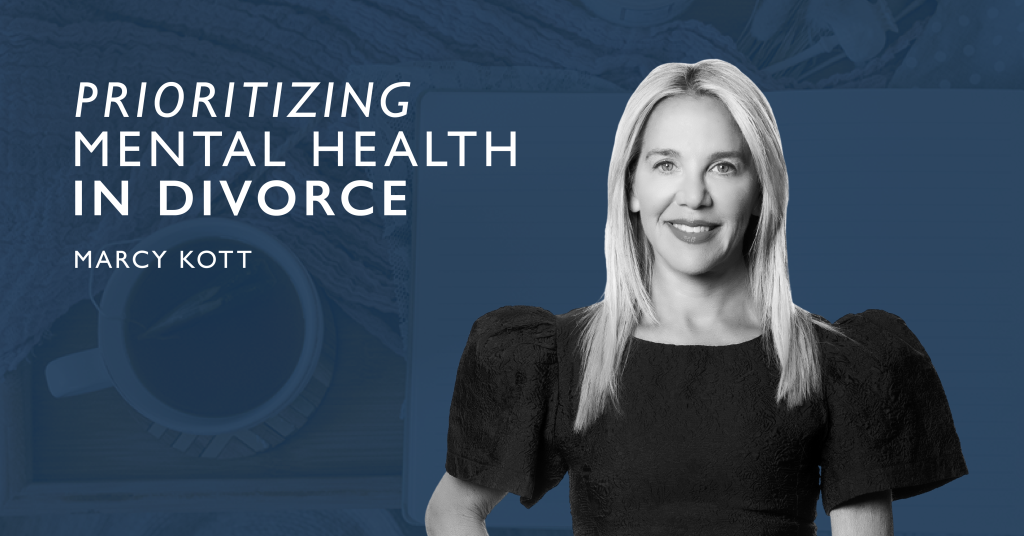
A new year represents change and new beginnings. It’s a time when people make resolutions, and often, it’s the symbolic push they need to bravely decide to leave relationships. It happens so frequently that, among family lawyers, January is often referred to unofficially as “Divorce Month.”
No matter when or why it happens, however, divorce is an emotionally draining process that requires you to sort through an enormous amount of emotions — doubt, fear of failure, anger, anxiety, despair — before emerging on the other side (hopefully) a stronger and happier person. Taking time to prioritize your mental well-being throughout the process is an underappreciated way to set yourself up for success.
The link between divorce and the need for mental care is undeniable. That is why I, along with my Berger Schatz colleague Brian Blitz, am spearheading an ongoing mental health roundtable to address how mental health and legal professionals can work in sync and better support each other and our clients throughout the process. Each stage of divorce has its challenges, and as attorneys, we’ve seen our clients reach more positive outcomes when they take time to care for their mental health every step of the way.
Before Divorce
Ideally, clients have already sought mental health counseling before they seek my counsel. Frequently, the decision to seek a divorce is not made with complete confidence. People worry they might be acting too hastily and may come to regret the breakup in the future. In such cases, a relatively new form of counseling called discernment counseling can be helpful.
Unlike traditional couples counseling, discernment counseling does not set out to solve problems within the marriage but rather to determine whether those problems can be solved. Some personal problems are simply intractable and cannot be solved within the relationship. For instance, certain mental health conditions such as Borderline Personality Disorder or long-term addictions make saving marriages difficult, if not impossible.
Discernment counseling is meant to identify such situations and move the couple straight to divorce, rather than allowing them to sit through months of frustrating and costly couples therapy with little chance of success. On the other hand, when discernment counseling shows that the marital problems are solvable, the spouses are better prepared to enter couples counseling and the hard work it will take to heal the relationship instead of dissolving it.
During Divorce
Even amicable divorces are emotionally taxing. Dealing with the end of a marriage through divorce can feel almost like the death of a loved one. Your life changes, and as with most changes, it’s natural to fear the unknown. Will you survive financially? Do you have the skill set to reenter the workforce? Will you end up alone?
In the midst of getting divorced, it can often be hard to recognize that this transition can be a new beginning. I often tell clients their initial meeting with me is the worst day of their lives; it only gets better from here! Life after divorce can be amazingly empowering. Viewing it as a new beginning in your life, rather than the end of your marriage, allows you to prioritize yourself and your happiness.
Yet, it takes time to come to grips with feelings of fear, inadequacy and loss. When you’re going through the uncoupling process, it’s advisable to work with a trained mental health professional who can help you cope with the added stress and anxiety in a healthy way.
Individual and family counseling are part of the mental health spectrum that people can, and often should, take advantage of during a divorce. For example, if a couple is divorcing over one spouse’s abuse of drugs or alcohol, substance abuse counseling is often beneficial for both — the person struggling with addiction can get the support and treatment they need while their spouse can learn how to cope with the impacts of the addiction on themselves and their families.
When facing the whirlwind of emotions brought about by divorce, you need to be at your best. Separation can trigger emotions like a major loss or failure, but it can also trigger positive emotions as well: new beginnings bring a sense of refreshment and peace as you move forward without the emotional drain of an unhappy marriage.
After Divorce
My clients often benefit from continuing therapy after the divorce is finalized, as they transition to experiencing the new reality they anticipated during the divorce process. They often have a new place to live or, if they kept the marital residence, a home filled with memories that feel strangely empty. Ongoing post-divorce issues such as child custody and continued financial disentanglement can create stressors that can also be worked through in counseling.
Many people have the impression that divorce is entirely about determining how to equitably distribute marital assets to each party. That is one priority, of course, but as an attorney specializing in family law, I see clients daily who can and do benefit from prioritizing self-care and their mental health. The real goal of a divorce proceeding is to allow both (ex-)spouses to build new lives for themselves — preferably happy and productive ones. I want my clients to live their best lives after their divorce. Often, that requires considering their emotional state as well as the legal issues surrounding their separation.
Lawyers should be aware that their clients frequently need more than legal counsel. A compassionate, experienced attorney should be prepared to work in sync with a mental health professional, with the client’s consent, to help guide them throughout the process. In the end, prioritizing your mental well-being throughout the process will allow you to navigate your divorce more successfully and emerge from it with a fresh start.